Comparing Propaganda: China Communist Party and Orwell's 1984
VerifiedAdded on 2023/04/23
|7
|1639
|68
Essay
AI Summary
This essay examines the use of propaganda by the Communist Party in China and the Party in George Orwell's *Nineteen Eighty-Four*, highlighting similarities in their techniques. Both entities employed aphorisms, rhetoric appeals (ethos, pathos, logos), imagery, and tone to manipulate public opinion and ensure political control. Examples include the aphorism "War is peace. Freedom is slavery. Ignorance is strength" from *Nineteen Eighty-Four* and the Chinese Communist Party's emphasis on a "Harmonious Society." Imagery such as the telescreens in *Nineteen Eighty-Four* and the red songs/scarves in China served to reinforce the ruling party's message. The essay concludes that propaganda was a powerful tool for maintaining control and suppressing dissent in both scenarios, effectively brainwashing citizens and fostering fear of the ruling powers. The essay also includes a manifesto for a fictional Liberal movement and a reflective journal.
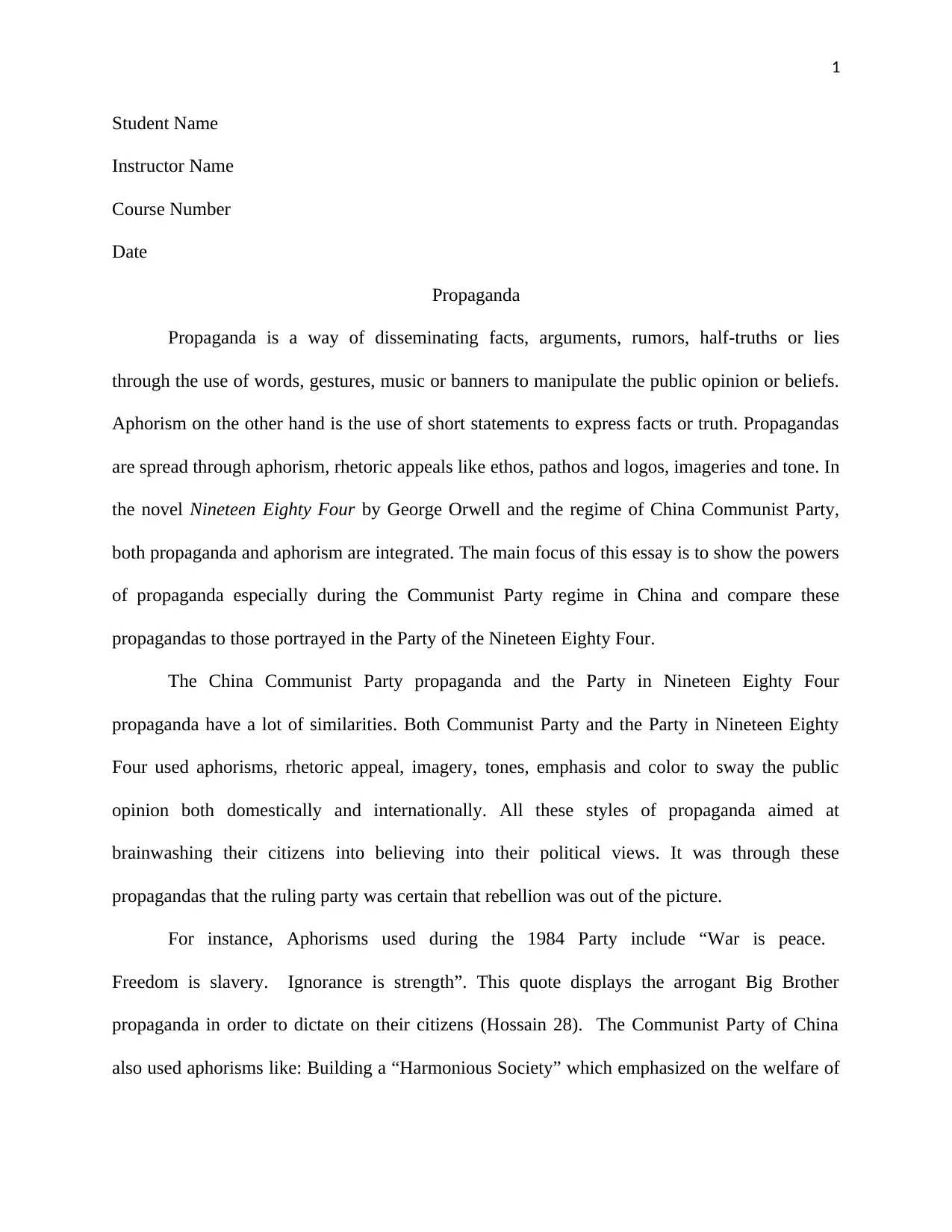
1
Student Name
Instructor Name
Course Number
Date
Propaganda
Propaganda is a way of disseminating facts, arguments, rumors, half-truths or lies
through the use of words, gestures, music or banners to manipulate the public opinion or beliefs.
Aphorism on the other hand is the use of short statements to express facts or truth. Propagandas
are spread through aphorism, rhetoric appeals like ethos, pathos and logos, imageries and tone. In
the novel Nineteen Eighty Four by George Orwell and the regime of China Communist Party,
both propaganda and aphorism are integrated. The main focus of this essay is to show the powers
of propaganda especially during the Communist Party regime in China and compare these
propagandas to those portrayed in the Party of the Nineteen Eighty Four.
The China Communist Party propaganda and the Party in Nineteen Eighty Four
propaganda have a lot of similarities. Both Communist Party and the Party in Nineteen Eighty
Four used aphorisms, rhetoric appeal, imagery, tones, emphasis and color to sway the public
opinion both domestically and internationally. All these styles of propaganda aimed at
brainwashing their citizens into believing into their political views. It was through these
propagandas that the ruling party was certain that rebellion was out of the picture.
For instance, Aphorisms used during the 1984 Party include “War is peace.
Freedom is slavery. Ignorance is strength”. This quote displays the arrogant Big Brother
propaganda in order to dictate on their citizens (Hossain 28). The Communist Party of China
also used aphorisms like: Building a “Harmonious Society” which emphasized on the welfare of
Student Name
Instructor Name
Course Number
Date
Propaganda
Propaganda is a way of disseminating facts, arguments, rumors, half-truths or lies
through the use of words, gestures, music or banners to manipulate the public opinion or beliefs.
Aphorism on the other hand is the use of short statements to express facts or truth. Propagandas
are spread through aphorism, rhetoric appeals like ethos, pathos and logos, imageries and tone. In
the novel Nineteen Eighty Four by George Orwell and the regime of China Communist Party,
both propaganda and aphorism are integrated. The main focus of this essay is to show the powers
of propaganda especially during the Communist Party regime in China and compare these
propagandas to those portrayed in the Party of the Nineteen Eighty Four.
The China Communist Party propaganda and the Party in Nineteen Eighty Four
propaganda have a lot of similarities. Both Communist Party and the Party in Nineteen Eighty
Four used aphorisms, rhetoric appeal, imagery, tones, emphasis and color to sway the public
opinion both domestically and internationally. All these styles of propaganda aimed at
brainwashing their citizens into believing into their political views. It was through these
propagandas that the ruling party was certain that rebellion was out of the picture.
For instance, Aphorisms used during the 1984 Party include “War is peace.
Freedom is slavery. Ignorance is strength”. This quote displays the arrogant Big Brother
propaganda in order to dictate on their citizens (Hossain 28). The Communist Party of China
also used aphorisms like: Building a “Harmonious Society” which emphasized on the welfare of
Paraphrase This Document
Need a fresh take? Get an instant paraphrase of this document with our AI Paraphraser
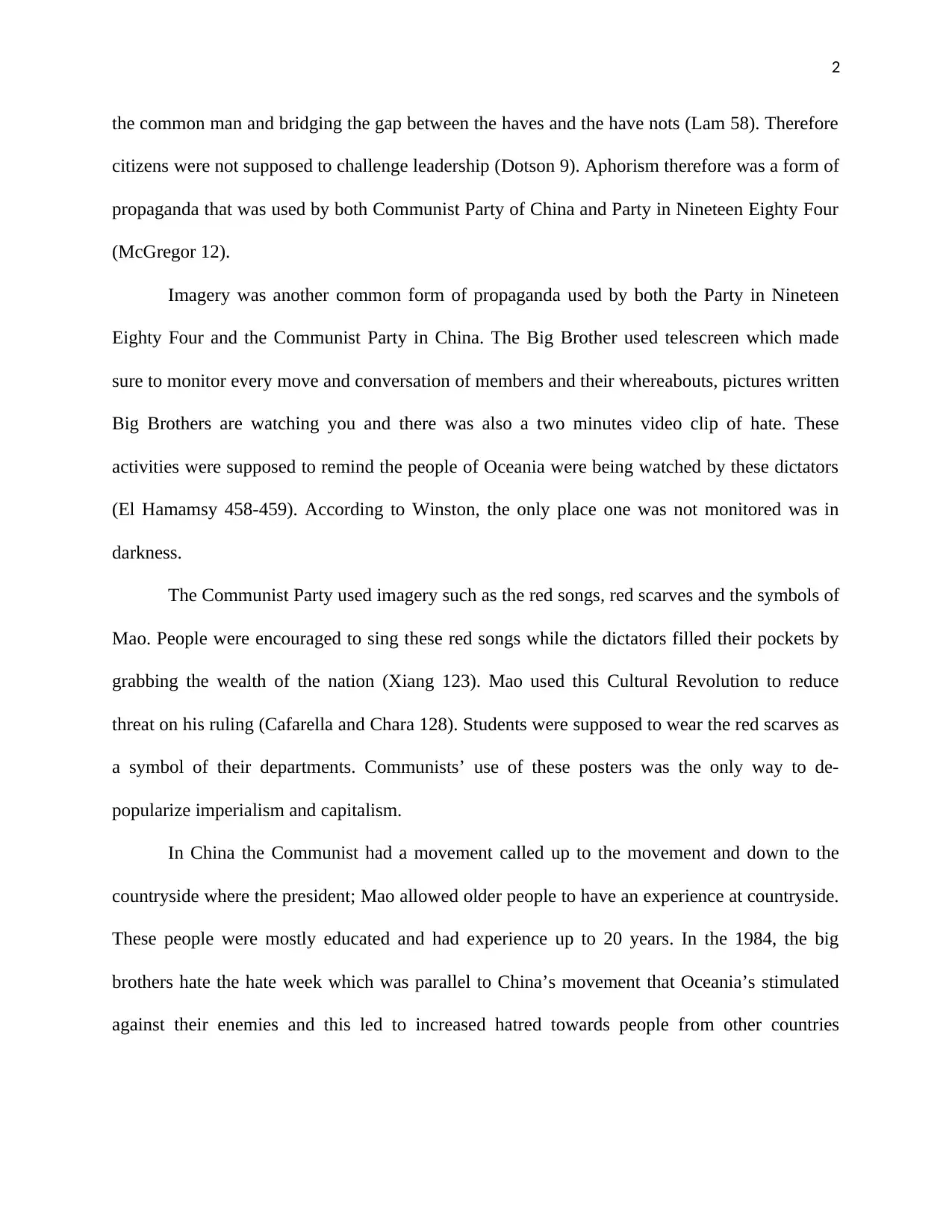
2
the common man and bridging the gap between the haves and the have nots (Lam 58). Therefore
citizens were not supposed to challenge leadership (Dotson 9). Aphorism therefore was a form of
propaganda that was used by both Communist Party of China and Party in Nineteen Eighty Four
(McGregor 12).
Imagery was another common form of propaganda used by both the Party in Nineteen
Eighty Four and the Communist Party in China. The Big Brother used telescreen which made
sure to monitor every move and conversation of members and their whereabouts, pictures written
Big Brothers are watching you and there was also a two minutes video clip of hate. These
activities were supposed to remind the people of Oceania were being watched by these dictators
(El Hamamsy 458-459). According to Winston, the only place one was not monitored was in
darkness.
The Communist Party used imagery such as the red songs, red scarves and the symbols of
Mao. People were encouraged to sing these red songs while the dictators filled their pockets by
grabbing the wealth of the nation (Xiang 123). Mao used this Cultural Revolution to reduce
threat on his ruling (Cafarella and Chara 128). Students were supposed to wear the red scarves as
a symbol of their departments. Communists’ use of these posters was the only way to de-
popularize imperialism and capitalism.
In China the Communist had a movement called up to the movement and down to the
countryside where the president; Mao allowed older people to have an experience at countryside.
These people were mostly educated and had experience up to 20 years. In the 1984, the big
brothers hate the hate week which was parallel to China’s movement that Oceania’s stimulated
against their enemies and this led to increased hatred towards people from other countries
the common man and bridging the gap between the haves and the have nots (Lam 58). Therefore
citizens were not supposed to challenge leadership (Dotson 9). Aphorism therefore was a form of
propaganda that was used by both Communist Party of China and Party in Nineteen Eighty Four
(McGregor 12).
Imagery was another common form of propaganda used by both the Party in Nineteen
Eighty Four and the Communist Party in China. The Big Brother used telescreen which made
sure to monitor every move and conversation of members and their whereabouts, pictures written
Big Brothers are watching you and there was also a two minutes video clip of hate. These
activities were supposed to remind the people of Oceania were being watched by these dictators
(El Hamamsy 458-459). According to Winston, the only place one was not monitored was in
darkness.
The Communist Party used imagery such as the red songs, red scarves and the symbols of
Mao. People were encouraged to sing these red songs while the dictators filled their pockets by
grabbing the wealth of the nation (Xiang 123). Mao used this Cultural Revolution to reduce
threat on his ruling (Cafarella and Chara 128). Students were supposed to wear the red scarves as
a symbol of their departments. Communists’ use of these posters was the only way to de-
popularize imperialism and capitalism.
In China the Communist had a movement called up to the movement and down to the
countryside where the president; Mao allowed older people to have an experience at countryside.
These people were mostly educated and had experience up to 20 years. In the 1984, the big
brothers hate the hate week which was parallel to China’s movement that Oceania’s stimulated
against their enemies and this led to increased hatred towards people from other countries
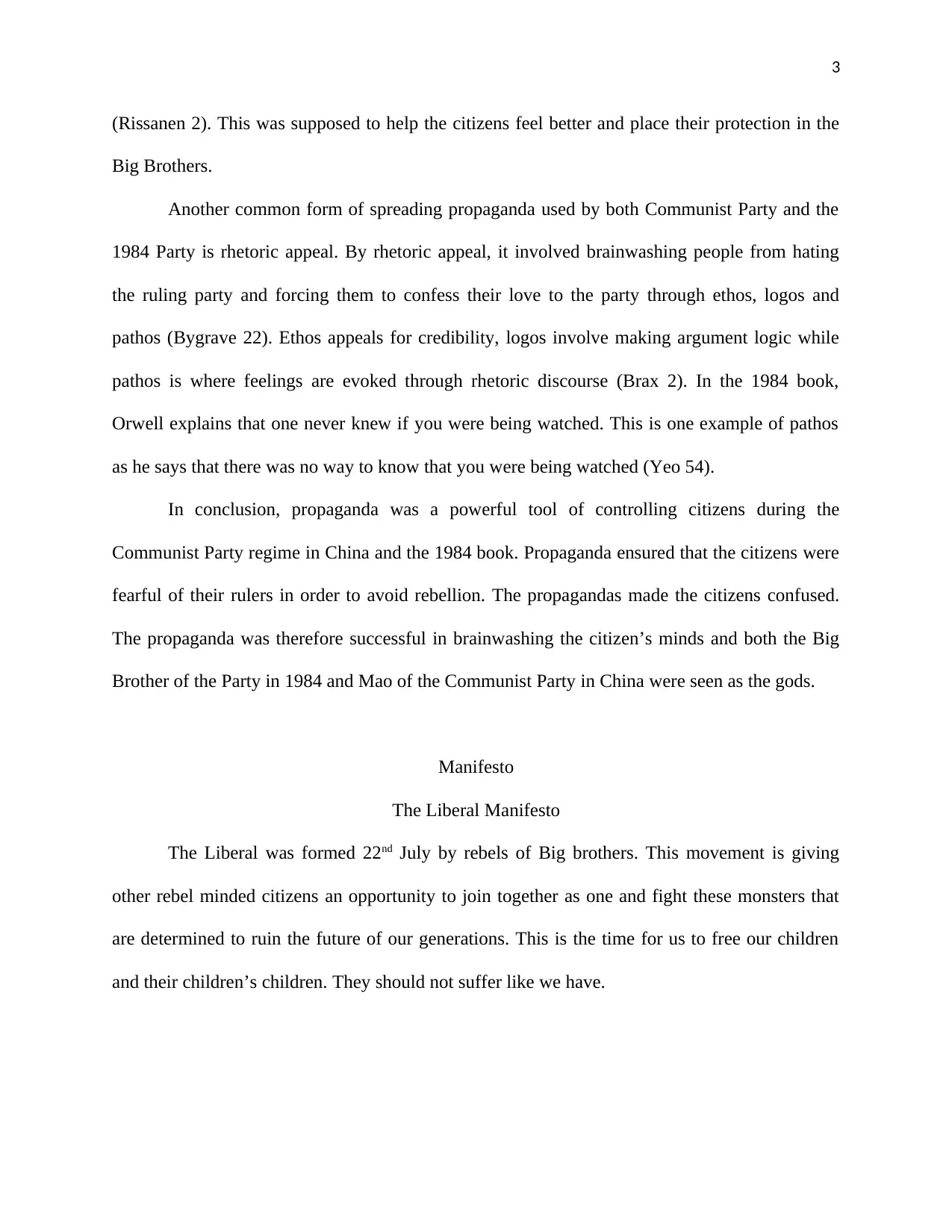
3
(Rissanen 2). This was supposed to help the citizens feel better and place their protection in the
Big Brothers.
Another common form of spreading propaganda used by both Communist Party and the
1984 Party is rhetoric appeal. By rhetoric appeal, it involved brainwashing people from hating
the ruling party and forcing them to confess their love to the party through ethos, logos and
pathos (Bygrave 22). Ethos appeals for credibility, logos involve making argument logic while
pathos is where feelings are evoked through rhetoric discourse (Brax 2). In the 1984 book,
Orwell explains that one never knew if you were being watched. This is one example of pathos
as he says that there was no way to know that you were being watched (Yeo 54).
In conclusion, propaganda was a powerful tool of controlling citizens during the
Communist Party regime in China and the 1984 book. Propaganda ensured that the citizens were
fearful of their rulers in order to avoid rebellion. The propagandas made the citizens confused.
The propaganda was therefore successful in brainwashing the citizen’s minds and both the Big
Brother of the Party in 1984 and Mao of the Communist Party in China were seen as the gods.
Manifesto
The Liberal Manifesto
The Liberal was formed 22nd July by rebels of Big brothers. This movement is giving
other rebel minded citizens an opportunity to join together as one and fight these monsters that
are determined to ruin the future of our generations. This is the time for us to free our children
and their children’s children. They should not suffer like we have.
(Rissanen 2). This was supposed to help the citizens feel better and place their protection in the
Big Brothers.
Another common form of spreading propaganda used by both Communist Party and the
1984 Party is rhetoric appeal. By rhetoric appeal, it involved brainwashing people from hating
the ruling party and forcing them to confess their love to the party through ethos, logos and
pathos (Bygrave 22). Ethos appeals for credibility, logos involve making argument logic while
pathos is where feelings are evoked through rhetoric discourse (Brax 2). In the 1984 book,
Orwell explains that one never knew if you were being watched. This is one example of pathos
as he says that there was no way to know that you were being watched (Yeo 54).
In conclusion, propaganda was a powerful tool of controlling citizens during the
Communist Party regime in China and the 1984 book. Propaganda ensured that the citizens were
fearful of their rulers in order to avoid rebellion. The propagandas made the citizens confused.
The propaganda was therefore successful in brainwashing the citizen’s minds and both the Big
Brother of the Party in 1984 and Mao of the Communist Party in China were seen as the gods.
Manifesto
The Liberal Manifesto
The Liberal was formed 22nd July by rebels of Big brothers. This movement is giving
other rebel minded citizens an opportunity to join together as one and fight these monsters that
are determined to ruin the future of our generations. This is the time for us to free our children
and their children’s children. They should not suffer like we have.
⊘ This is a preview!⊘
Do you want full access?
Subscribe today to unlock all pages.

Trusted by 1+ million students worldwide
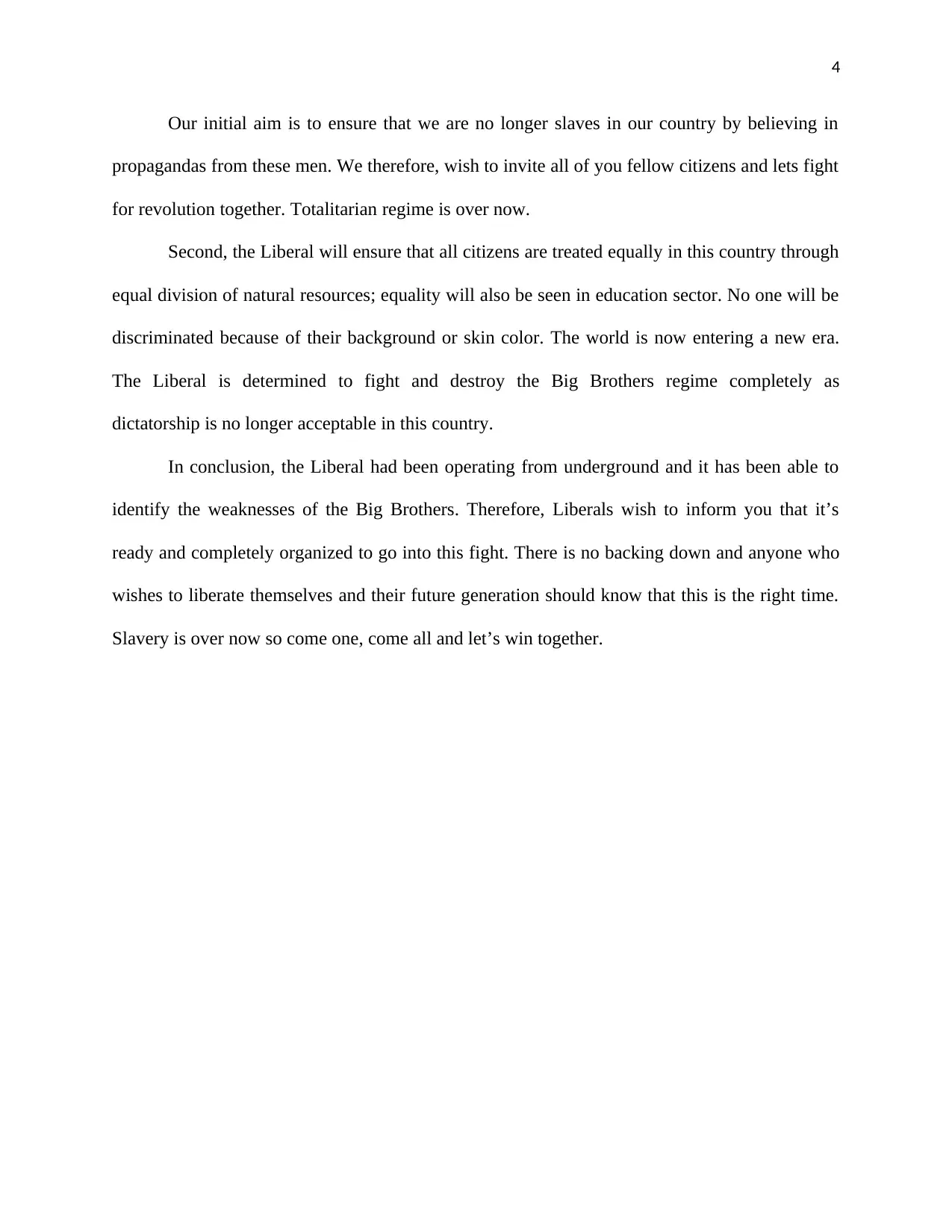
4
Our initial aim is to ensure that we are no longer slaves in our country by believing in
propagandas from these men. We therefore, wish to invite all of you fellow citizens and lets fight
for revolution together. Totalitarian regime is over now.
Second, the Liberal will ensure that all citizens are treated equally in this country through
equal division of natural resources; equality will also be seen in education sector. No one will be
discriminated because of their background or skin color. The world is now entering a new era.
The Liberal is determined to fight and destroy the Big Brothers regime completely as
dictatorship is no longer acceptable in this country.
In conclusion, the Liberal had been operating from underground and it has been able to
identify the weaknesses of the Big Brothers. Therefore, Liberals wish to inform you that it’s
ready and completely organized to go into this fight. There is no backing down and anyone who
wishes to liberate themselves and their future generation should know that this is the right time.
Slavery is over now so come one, come all and let’s win together.
Our initial aim is to ensure that we are no longer slaves in our country by believing in
propagandas from these men. We therefore, wish to invite all of you fellow citizens and lets fight
for revolution together. Totalitarian regime is over now.
Second, the Liberal will ensure that all citizens are treated equally in this country through
equal division of natural resources; equality will also be seen in education sector. No one will be
discriminated because of their background or skin color. The world is now entering a new era.
The Liberal is determined to fight and destroy the Big Brothers regime completely as
dictatorship is no longer acceptable in this country.
In conclusion, the Liberal had been operating from underground and it has been able to
identify the weaknesses of the Big Brothers. Therefore, Liberals wish to inform you that it’s
ready and completely organized to go into this fight. There is no backing down and anyone who
wishes to liberate themselves and their future generation should know that this is the right time.
Slavery is over now so come one, come all and let’s win together.
Paraphrase This Document
Need a fresh take? Get an instant paraphrase of this document with our AI Paraphraser
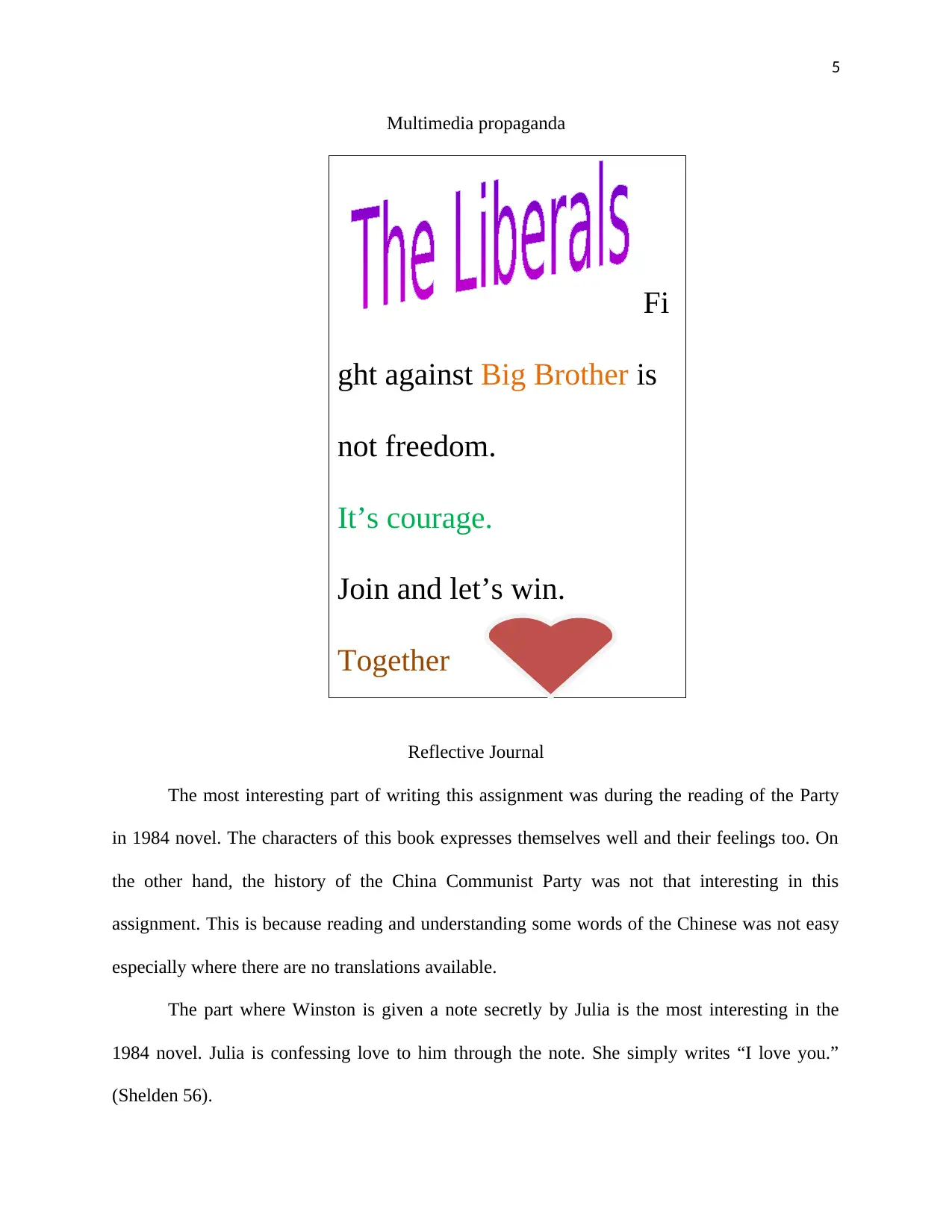
5
Multimedia propaganda
Fi
ght against Big Brother is
not freedom.
It’s courage.
Join and let’s win.
Together
Reflective Journal
The most interesting part of writing this assignment was during the reading of the Party
in 1984 novel. The characters of this book expresses themselves well and their feelings too. On
the other hand, the history of the China Communist Party was not that interesting in this
assignment. This is because reading and understanding some words of the Chinese was not easy
especially where there are no translations available.
The part where Winston is given a note secretly by Julia is the most interesting in the
1984 novel. Julia is confessing love to him through the note. She simply writes “I love you.”
(Shelden 56).
Multimedia propaganda
Fi
ght against Big Brother is
not freedom.
It’s courage.
Join and let’s win.
Together
Reflective Journal
The most interesting part of writing this assignment was during the reading of the Party
in 1984 novel. The characters of this book expresses themselves well and their feelings too. On
the other hand, the history of the China Communist Party was not that interesting in this
assignment. This is because reading and understanding some words of the Chinese was not easy
especially where there are no translations available.
The part where Winston is given a note secretly by Julia is the most interesting in the
1984 novel. Julia is confessing love to him through the note. She simply writes “I love you.”
(Shelden 56).
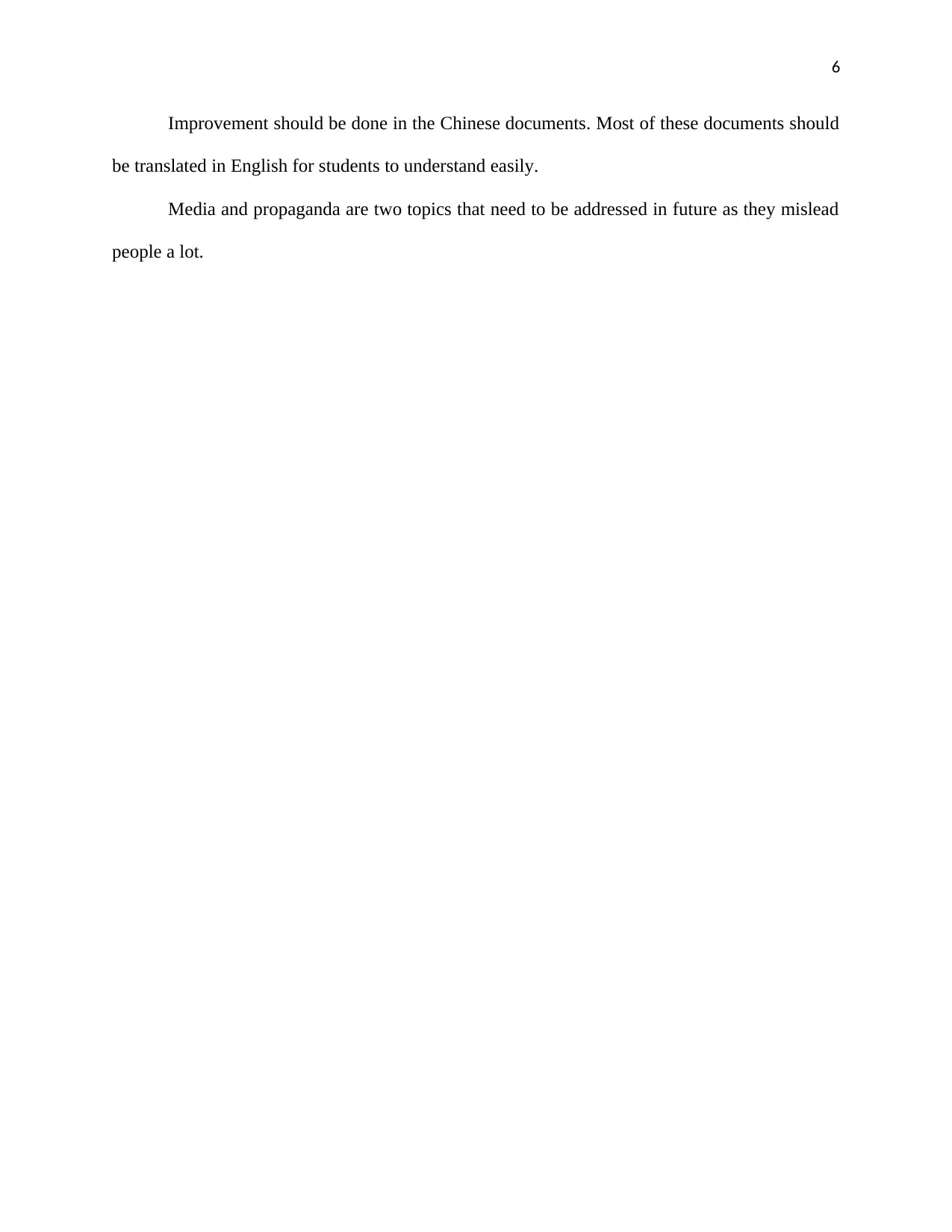
6
Improvement should be done in the Chinese documents. Most of these documents should
be translated in English for students to understand easily.
Media and propaganda are two topics that need to be addressed in future as they mislead
people a lot.
Improvement should be done in the Chinese documents. Most of these documents should
be translated in English for students to understand easily.
Media and propaganda are two topics that need to be addressed in future as they mislead
people a lot.
⊘ This is a preview!⊘
Do you want full access?
Subscribe today to unlock all pages.

Trusted by 1+ million students worldwide
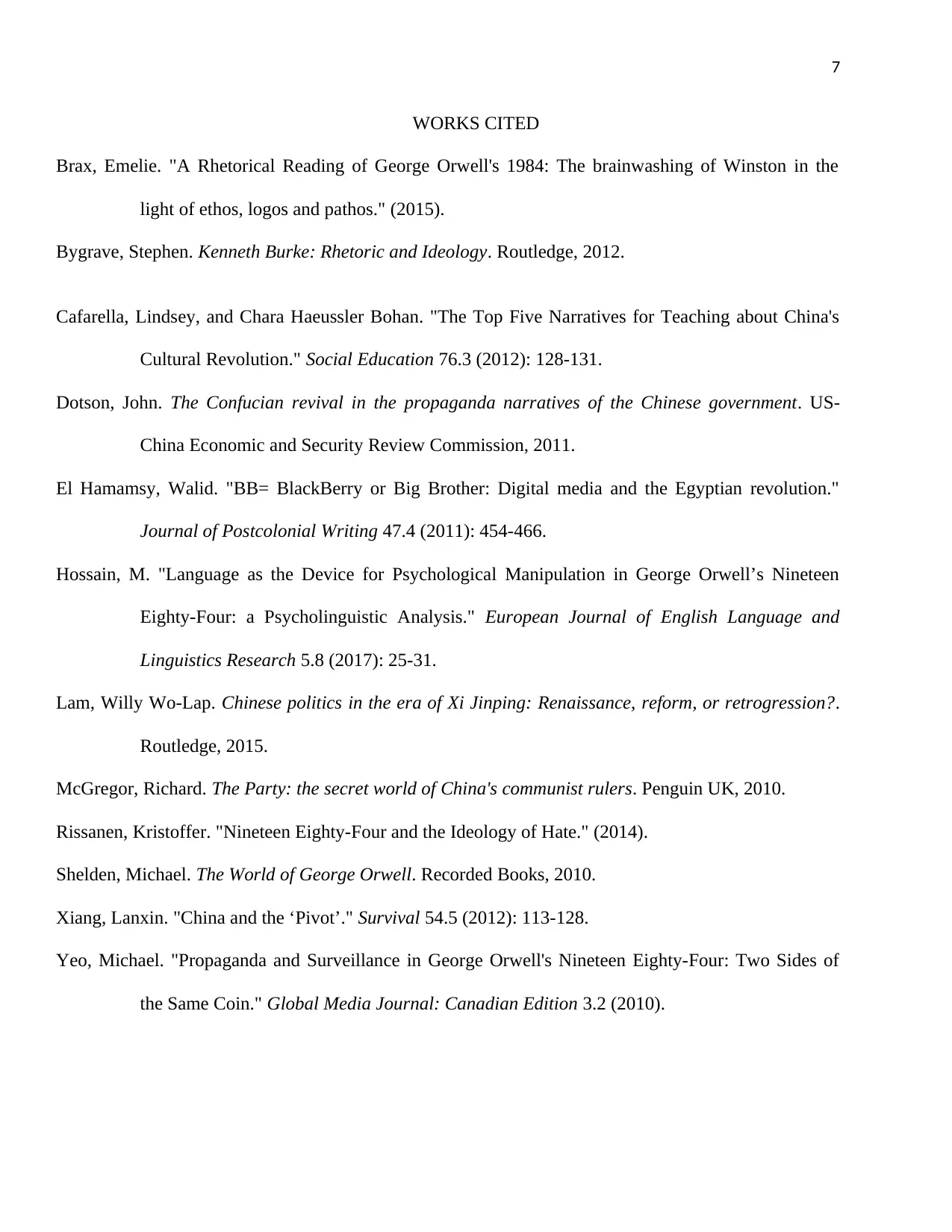
7
WORKS CITED
Brax, Emelie. "A Rhetorical Reading of George Orwell's 1984: The brainwashing of Winston in the
light of ethos, logos and pathos." (2015).
Bygrave, Stephen. Kenneth Burke: Rhetoric and Ideology. Routledge, 2012.
Cafarella, Lindsey, and Chara Haeussler Bohan. "The Top Five Narratives for Teaching about China's
Cultural Revolution." Social Education 76.3 (2012): 128-131.
Dotson, John. The Confucian revival in the propaganda narratives of the Chinese government. US-
China Economic and Security Review Commission, 2011.
El Hamamsy, Walid. "BB= BlackBerry or Big Brother: Digital media and the Egyptian revolution."
Journal of Postcolonial Writing 47.4 (2011): 454-466.
Hossain, M. "Language as the Device for Psychological Manipulation in George Orwell’s Nineteen
Eighty-Four: a Psycholinguistic Analysis." European Journal of English Language and
Linguistics Research 5.8 (2017): 25-31.
Lam, Willy Wo-Lap. Chinese politics in the era of Xi Jinping: Renaissance, reform, or retrogression?.
Routledge, 2015.
McGregor, Richard. The Party: the secret world of China's communist rulers. Penguin UK, 2010.
Rissanen, Kristoffer. "Nineteen Eighty-Four and the Ideology of Hate." (2014).
Shelden, Michael. The World of George Orwell. Recorded Books, 2010.
Xiang, Lanxin. "China and the ‘Pivot’." Survival 54.5 (2012): 113-128.
Yeo, Michael. "Propaganda and Surveillance in George Orwell's Nineteen Eighty-Four: Two Sides of
the Same Coin." Global Media Journal: Canadian Edition 3.2 (2010).
WORKS CITED
Brax, Emelie. "A Rhetorical Reading of George Orwell's 1984: The brainwashing of Winston in the
light of ethos, logos and pathos." (2015).
Bygrave, Stephen. Kenneth Burke: Rhetoric and Ideology. Routledge, 2012.
Cafarella, Lindsey, and Chara Haeussler Bohan. "The Top Five Narratives for Teaching about China's
Cultural Revolution." Social Education 76.3 (2012): 128-131.
Dotson, John. The Confucian revival in the propaganda narratives of the Chinese government. US-
China Economic and Security Review Commission, 2011.
El Hamamsy, Walid. "BB= BlackBerry or Big Brother: Digital media and the Egyptian revolution."
Journal of Postcolonial Writing 47.4 (2011): 454-466.
Hossain, M. "Language as the Device for Psychological Manipulation in George Orwell’s Nineteen
Eighty-Four: a Psycholinguistic Analysis." European Journal of English Language and
Linguistics Research 5.8 (2017): 25-31.
Lam, Willy Wo-Lap. Chinese politics in the era of Xi Jinping: Renaissance, reform, or retrogression?.
Routledge, 2015.
McGregor, Richard. The Party: the secret world of China's communist rulers. Penguin UK, 2010.
Rissanen, Kristoffer. "Nineteen Eighty-Four and the Ideology of Hate." (2014).
Shelden, Michael. The World of George Orwell. Recorded Books, 2010.
Xiang, Lanxin. "China and the ‘Pivot’." Survival 54.5 (2012): 113-128.
Yeo, Michael. "Propaganda and Surveillance in George Orwell's Nineteen Eighty-Four: Two Sides of
the Same Coin." Global Media Journal: Canadian Edition 3.2 (2010).
1 out of 7
Your All-in-One AI-Powered Toolkit for Academic Success.
+13062052269
info@desklib.com
Available 24*7 on WhatsApp / Email
![[object Object]](/_next/static/media/star-bottom.7253800d.svg)
Unlock your academic potential
Copyright © 2020–2025 A2Z Services. All Rights Reserved. Developed and managed by ZUCOL.

